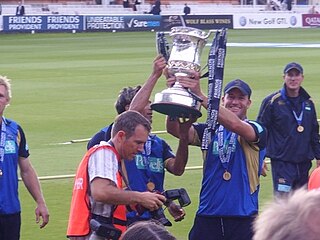Related Research Articles
The 2005 English cricket season was the 106th in which the County Championship had been an official competition. Before it began, a resurgent England cricket team had won four Test series in a row, going unbeaten through the 2004 calendar year. The start of the international season saw England defeat Bangladesh 2–0 in their two-match series, winning both Tests by an innings. This was followed by a tri-nations one-day tournament that also featured Australia. Australia still started the Test series as favourites but most fans expected England to put up a challenge.

The Friends Provident Trophy was a one-day cricket competition in the United Kingdom.
Philip John Newport is a former English first-class cricketer, who played primarily as a seam and swing bowler. Newport was a stalwart of Worcestershire County Cricket Club for most of the 1980s and 1990s, and played a key part in the county's triumphs in the late 1980s. Newport played in three Test matches for England between 1988 and 1991. He was born at High Wycombe in 1962.
Timothy Alan Munton is an English cricketer. He had a long career in county cricket, playing over 500 games combined between first-class and List A, primarily with Warwickshire before ending his career at Derbyshire. He also played two Test matches for England in the 1992 series against Pakistan, and went on a number of England A tours. A medium pace bowler and lower order batsman, cricket writer Colin Bateman stated, "at 6ft 6in, with an ability to make the ball swing, Munton is at his best in English conditions". His time at Warwickshire was a particularly successful one for the club, winning 6 trophies between 1993 and 1995; as a crucial part of that side, Munton was honoured as one of the five Wisden Cricketers of the Year in 1995.
Harold James Rhodes is an English former international cricketer who played two Test matches for England in 1959. He played domestically for Derbyshire between 1953 and 1975 and played one day matches for Nottinghamshire between 1970 and 1973.
Geoffrey Miller, is an English former cricketer, who played in 34 Test matches and 25 One Day Internationals for the England cricket team between 1976 and 1984. Nicknamed "Dusty", he played for Derbyshire from 1973 to 1986, captaining the side from 1979 to 1981, and returned in 1990 after playing for Essex between 1987 and 1989. He was an England selector from 2008 to 2013 and was appointed President of Derbyshire C.C.C. in March 2014. He was a part of the English squad which finished as runners-up at the 1979 Cricket World Cup.
Edward Ernest Hemmings is a former English cricketer, who played in 16 Test matches and 33 One Day Internationals for the England cricket team between 1982 and 1991. He made his England debut relatively late in his career, at the age of 33, having predominantly represented Nottinghamshire in the County Championship. His chance came when several England players announced their intention to go on a rebel cricket tour to South Africa. He was a part of the English squad which finished as runners-up at the 1987 Cricket World Cup.
Harry Storer was an English professional footballer, cricketer and football manager.
The 1996 English cricket season was the 97th in which the County Championship had been an official competition. England hosted tours by India and Pakistan, who each played three Tests and three ODIs. Against India, England were unbeaten, winning the Test series 1–0 and the ODI series 2–0. However, against the Pakistanis England lost 2–0 in the Tests, and had to console themselves with a 2–1 ODI series victory.
Dallas Moir is a Maltese-born Scottish former cricketer who played first-class cricket for Scotland in 1980 and 1986 and for Derbyshire between 1981 and 1985.
Kevin Graham Brooks is an English cricketer who played first-class and one-day cricket for Derbyshire in 1980 and 1981.
Paul Geoffrey Newman is an English former cricketer who played for Derbyshire County Cricket Club between 1980 and 1989.
Thomas John Peter Eyre is a former English cricketer who played for Derbyshire between 1959 and 1972.
Michael Stephen Anthony McEvoy is an Indian-born former English first-class cricketer who played first-class and List A cricket between 1976 and 1990, with the bulk of his career being between 1980 and 1984.
John Darling Inchmore is a former English cricketer who played first-class and List A cricket for Worcestershire during the 1970s and 1980s. He also played briefly for Northern Transvaal, and later for Wiltshire.
Arthur Morton was an English cricketer who played first-class cricket for Derbyshire and Marylebone Cricket Club (MCC) between 1903 and 1926. He made over 10,000 runs and took nearly 1,000 wickets.
James Horsley was an English cricketer who played first-class cricket for Nottinghamshire in 1913 and for Derbyshire from 1914 to 1925
Keith Stevenson is a former English first-class cricketer who played for Derbyshire from 1974 to 1977 and for Hampshire from 1978 to 1984.
Jonathan Mark Fielding is an English cricketer. Fielding is a right-handed batsman who bowls slow left-arm orthodox. He was born in Bury, Lancashire.
Mark Roger Gouldstone is a former English cricketer. Gouldstone was a right-handed batsman who bowled right-arm medium pace. He was born in Bishop's Stortford, Hertfordshire.
References
- 1 2 Clements, Derek (11 June 2006). "Caught in Time: Derbyshire win NatWest Trophy, 1981". The Sunday Times. London: Times Newspapers. Retrieved 12 June 2008.[ dead link ]
- ↑ Colin Tunnicliffe at Cricket Archive